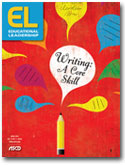Most of my middle school kids hate to write," a student teacher relates. "They don't see it as personally rewarding but as just a lot of work." Impressed that one of her struggling students drafted a musical composition for the drums, she tries to show him a connection. "You wrote that," she points out. "That's fantastic."
"I didn't write it," he says. "I just did it."
"You composed it; that's what writing is all about," she says. He looks at her in amazement.
For as long as teachers have been attempting to teach their students to improve their writing, they have struggled with how much to emphasize the hard work involved while also attempting to convince their students that writing well can be useful, a joy, and even an art.
At certain points in past decades, the pendulum in schools has swung toward teaching writing fundamentals—learning grammar, studying structure, mastering vocabulary. Think of the 1950s when kids spent hours diagramming sentences and learning parts of speech, or, much later, when they learned that every paragraph had to have five sentences. Then the pendulum swung again, and some teachers erred on the side of the "assign it and they will write" philosophy. Or worse, they did not assign any serious writing at all.
In between, at various intervals, the pendulum swung toward the middle when those who embraced teaching the writing process (I confess I was one of them) did their best to inspire kids to write about what they knew—as well as to revise and revise—and to learn the basics in context.
Now, with the implementation of the Common Core State Standards nearing, the teaching of writing grows even more complicated. Teachers are being asked to revisit some important fundamentals like citing evidence and teaching subordinate clauses. (See Peg Tyre's story about New Dorp High School in Staten Island for a convincing success story of a school that adopted just such an approach.) But the Common Core standards do not strongly highlight all research-based practices, leaving out, for example, free writing, summarization, revisions, rubrics, and motivation. (See the research report.) The fact is, we need to make use of all tested methods in our arsenal if we are to teach every student to write well.
So how are teachers of all subjects going to meet the challenges of teaching students to be effective writers who don't hate to write? How are they going to prepare students to engage in all kinds of writing that they will need in the future—academic discourse, report writing, journalism, personal narrative, and even tweets? Today, social media of all kinds provide us outlets to share our personal ideas like never before. In the blogosphere, however, the highly structured five-paragraph essays rarely are those most clicked on. Come to think of it, which of your favorite books do you remember for their great sentence combinations? A new kind of literate writing is called for.
Our authors have a number of strategies to offer. Carol Jago reminds us that students can't learn to write without practice: "Most students do not write enough to learn to write well." Offering feedback in the context of the student's own writing is another important technique (pp. 22, 40, 56) as is using mentor texts to analyze writing techniques (pp. 16, 28, 34). Other authors describe how to teach argument writing (p. 46, online); collaborate in digital space; and revamp the classroom research project.
Mary Ehrenworth recommends another simple but powerful idea: Enlist parents as their children's first reader. She provides tips on how to explain your writing program to families and offers guidance on what adults can say as they talk with children about writing.
"At its most basic, we are only discussing a learned skill," Stephen King writes in his memoir, On Writing. "We are talking about tools and carpentry, about words and style … but as we move along, you'd do well to remember that we are also talking about magic."
<P ID="scherer-audio"><!-- Start of Brightcove Player --><!--div style="display:none"></div--><!--By use of this code snippet, I agree to the Brightcove Publisher T and C found at https://accounts.brightcove.com/en/terms-and-conditions/. --> <!--<object id="myExperience3372372455001" class="BrightcoveExperience"> <param name="bgcolor" value="#FFFFFF" /><param name="width" value="570" /><param name="height" value="380" /><param name="playerID" value="18377529001" /> <param name="playerKey" value="AQ~~,AAAAAmGjiRE~,escbD3Me8-wT_coVb7sTe18vG6vv3Oyk" /> <param name="isVid" value="true" /><param name="dynamicStreaming" value="true" /><param name="@videoPlayer" value="3372372455001" /> </object>--><!-- This script tag will cause the Brightcove Players defined above it to be created as soonas the line is read by the browser. If you wish to have the player instantiated only afterthe rest of the HTML is processed and the page load is complete, remove the line.--><!-- End of Brightcove Player --><!-- use this code for HTML --> <!-- <object id="flashObj" width="486" height="412" classid="clsid:D27CDB6E-AE6D-11cf-96B8-444553540000" codebase="http://download.macromedia.com/pub/shockwave/cabs/flash/swflash.cab#version=9,0,47,0"><param name="movie" value="http://c.brightcove.com/services/viewer/federated_f9?isVid=1" /><param name="bgcolor" value="#FFFFFF" /><param name="flashVars" value="videoId=3372372455001&playerID=11490813001&playerKey=AQ~~,AAAAAmGjiRE~,escbD3Me8-zfW2J4SI2ZSHPsqtup23tT&domain=embed&dynamicStreaming=true" /><param name="base" value="http://admin.brightcove.com" /><param name="seamlesstabbing" value="false" /><param name="allowFullScreen" value="true" /><param name="swLiveConnect" value="true" /><param name="allowScriptAccess" value="always" /><embed src="http://c.brightcove.com/services/viewer/federated_f9?isVid=1" bgcolor="#FFFFFF" flashVars="videoId=3372372455001&playerID=11490813001&playerKey=AQ~~,AAAAAmGjiRE~,escbD3Me8-zfW2J4SI2ZSHPsqtup23tT&domain=embed&dynamicStreaming=true" base="http://admin.brightcove.com" name="flashObj" width="486" height="412" seamlesstabbing="false" type="application/x-shockwave-flash" allowFullScreen="true" swLiveConnect="true" allowScriptAccess="always" pluginspage="http://www.macromedia.com/shockwave/download/index.cgi?P1_Prod_Version=ShockwaveFlash"></embed></object>-->


